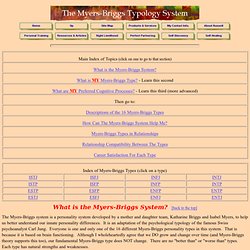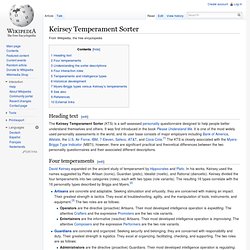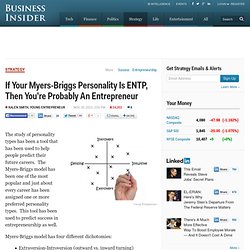

MBTI.
Myers-Briggs Typology System. What is the Myers-Briggs System?

[back to the top] The Myers-Briggs system is a personality system developed by a mother and daughter team, Katharine Briggs and Isabel Myers, to help us better understand our innate personality differences. It is an adaptation of the psychological typology of the famous Swiss psychoanalyst Carl Jung. Everyone is one and only one of the 16 different Myers-Briggs personality types in this system. That is because it is based on brain functioning. There are three terms that you will need to become familiar with in this system if you want to understand it better. Myers-Briggs lists four pairs of opposite preferences.
. (1) Extraverting (E) versus Introverting (I) Where we prefer to focus our attention and what energizes us (2) Sensing (S) versus iNtuiting (N) How we prefer to take in information (3) Thinking (T) versus Feeling (F) How we evaluate information and make decisions (4) Judging (J) versus Perceiving (P) What lifestyle we prefer What is MY Myers-Briggs Type? Relationship Pairs: Definitions. Estimated Frequencies of Types. Celebrity Types - Overview. Relationship Pairs: Definitions. Keirsey Temperament Sorter. Heading text[edit] The Keirsey Temperament Sorter (KTS) is a self-assessed personality questionnaire designed to help people better understand themselves and others.

It was first introduced in the book Please Understand Me. It is one of the most widely used personality assessments in the world, and its user base consists of major employers including Bank of America, Allstate, the U.S. Air Force, IBM, 7-Eleven, Safeco, AT&T, and Coca-Cola.[1] The KTS is closely associated with the Myers-Briggs Type Indicator (MBTI); however, there are significant practical and theoretical differences between the two personality questionnaires and their associated different descriptions.
Four temperaments[edit] David Keirsey expanded on the ancient study of temperament by Hippocrates and Plato. Artisans are concrete and adaptable. Guardians are concrete and organized. Idealists are abstract and compassionate. Rationals are abstract and objective. Understanding the sorter descriptions[edit] See also[edit] Personal Growth. Perhaps the most important realization that an individual can make in their quest for personal growth is that there is no single formula that defines the path to personal success. We all have different goals and priorities, which means that different activities and attitudes will make us feel good about ourselves.
We also have different natural strengths and weaknesses that are a part of our inherent personality type. How then, as individuals, can we feel successful in our lives? Each personality type has a different idea of what it means to be successful. Self-knowledge is one common goal that will help everyone achieve personal success.
While improving our self-knowledge and realizing our true goals can be very liberating, we should not discard the rules of the society in which we live. For example, there are situations in which it is more appropriate and effective to show compassion and caring (Feeling), rather than impersonal logic (Thinking). If Your Myers-Briggs Personality Is ENTP, Then You're Probably An Entrepreneur. Young Entrepreneur The study of personality types has been a tool that has been used to help people predict their future careers.

The Myers-Briggs model has been one of the most popular and just about every career has been assigned one or more preferred personality types. This tool has been used to predict success in entrepreneurship as well. Myers-Briggs model has four different dichotomies: Extraversion-Introversion (outward vs. inward turning)Sensing-Intuitiveness (preference towards concrete information or abstract concepts)Thinking-Feeling (tendency to solve problems through either logical reasoning or empathizing)Judgment/Perception (need for structure or preference for freestyle thinking) According to this model, the preferred style for entrepreneurs is the ENTP.
On the surface, this model seems to be highly accurate. Personally, I find the last element of the model a little confusing.